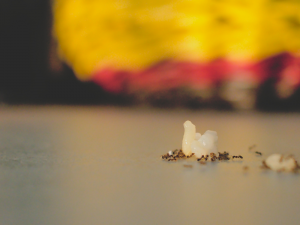Our 7 Best Tips for Controlling Pests This Summer
From breezy backyard barbeques to long picnics in the park, there’s a lot to look forward to this summer. One unfortunate downside of the warmer seasons, however, is the increased presence of bugs, insects, and other annoying pests.
It goes without saying that having your home and gardens plagued by mosquitoes, flies, and other insects is no fun, so it’s important to take early preventative action. Luckily, there are lots of easy measures you can take today to prevent these problems from ever spiralling out of control. Say goodbye to itchy insect bites and hello to a pest-free summer! Here are some actions you can take today:
Reduce moisture in your home and eliminate standing water
Insects and bugs love water and moisture. Just as humans need water for survival, so too do pests. The summer months often bring on dryer weather, so insects and bugs will venture into homes and backyards in search of water and moisture. If you’re not careful, an entire insect habitat will have made themselves right at home in your backyard before you even notice.
An easy way to prevent this from happening is to reduce moisture in your home. This may involve keeping drainage areas and gutters clear, addressing and fixing leaks, and keeping stagnant water in buckets, flowerpots, pet water bowls, birdbaths, and other areas to an absolute minimum. If you happen to live in a humid area, you could even consider purchasing a dehumidifier to control your home’s moisture levels.

Clear out rubbish daily
It might seem like a no-brainer, but clearing out rubbish and tidying your home regularly is one of the most effective and simple ways to ward off pests. If there are no food sources in the home to feed on, then there’s no reason for insects and other pests to linger around your property.
During the summer months, make sure that you keep a close eye on your fruit bowl and your kitchen countertop. Food goes off quicker during the warmer seasons, and it’s well-known that pests such as ants, fruit flies, house flies, and cockroaches love to feed on rotting fruit and produce. As soon as any produce on the countertop becomes overripe, toss it out!
Harness the power of plants
Some plants are naturally bug-repellant and provide natural remedies for treating pest problems around the home. Plants like rosemary, basil, lavender, and lemon balm are great species to incorporate into your home or garden. Not only will you get to enjoy some delicious fresh herbs, you’ll also keep the bugs and insects at bay – a win-win in our books!

Reduce firewood and timber lying around your home
Termites love firewood. In fact, timber is one of their main food sources. Although they’re small, termites can do a lot of harm. Once termites have found a way into your home, they can cause widespread structural damage that could cost thousands upon thousands of dollars to repair. The best way to prevent this from ever happening is by restricting their access to your home. One of the best ways you can do this is by storing your firewood outside and away from your house.
During the summer months, you should keep your firewood dry and store it away from your house above ground level (ideally, at least 30cm off the ground so that the termites aren’t able to crawl directly onto the wood pile). If you do happen to find termites or other pests in your firewood, you should never pour any pesticides or chemicals over them. When this firewood is eventually burned, it will release toxic fumes into your home. If in doubt, always call a professional pest control technician to assess and treat the situation.

Prepare your yard
Keeping your yard clean and tidy is key to preventing unwanted insects and bugs from coming near your home. Overgrown shrubs and plants act as great hiding spots for all sorts of pests, so try to get into a regular routine of mowing your lawn, trimming your plants and shrubs, and weeding your garden at least every few weeks. If you’re short on time or if you simply don’t enjoy gardening, you could always consider booking your property in for a regular home gardening service.
Seal up any gaps and cracks
In order for a pest to enter your home, they must first find an entry point. Sealing up gaps and cracks are one of the easiest yet most effective ways of preventing pests from accessing your home.
There may be more entry points into your home than you realise. Common culprits include windows and doors, grout in bathtubs and showers, plaster walls, and flyscreens. Even the smallest gap can be large enough for a swarm of bugs or insects to weasel their way into your property, so addressing these issues quickly can save you a lot of trouble in the long-term. For those of us who are DIY-averse, there’s always an option to call in a professional handyman to complete these jobs.
Hire a professional pest control service
If you’d like a more in-depth assessment and service of your property, the best option would be to hire a professional pest control service. A pest control specialist will work with you to inspect and identify key areas of concern in your property, which will allow them to develop a sustainable and customised pest control plan. It’s a great way to cover all your bases before summer begins so that you can enjoy a stress-free, pest-free holiday season.
Bugs, insects, and rodents are a part of life, but there’s no reason why they should ruin your summer. If you’re in need of a thorough and comprehensive pest control plan, contact Jim’s Termite & Pest Control today. With decades of experience under our belt, our pest control specialists will be able to provide you with the best advice for your unique situation. Give Jim’s Group a call on 131 546 to enquire online today and to receive your obligation-free quote.
Related Jim’s Group News
– 4 Common Pest Animals and How to Handle Them?
– Do Insurance Policies Cover Pest Control?
– How to Get Rid of Cockroaches in Your Home.
– Recent Rains and the Effects on Pests.
– Who Pays for Pest Control in a Rental Property? All Your Questions Answered.
– Wishing for a Pest-Free Christmas? Here are Our Top Pest Control Tips.





